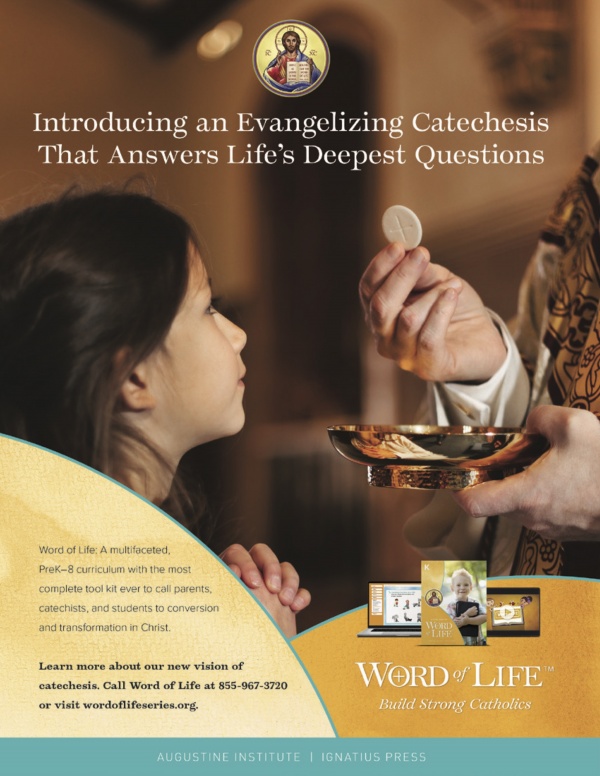Evangelization and Personal Freedom
If someone is married, in love, or has ever been in love, they can likely tell you when they knew they were in love and, more importantly, when they knew their significant other was in love with them. It’s also likely that one of the individuals fell in love first. Their heart had been moved and they had “arrived” to love. After having arrived, they had to do one of the hardest things: they had to wait. Why wait? Well, because love cannot be rushed, and it certainly cannot be forced. It must profoundly respect the freedom of the other because a love that is forced is no love at all—it is coercion. The human heart is only meant to open from within: to make a free choice to love.
Jesus spoke often about the heart of man. Speaking of the Pharisees he says, “This people honors me with their lips, but their heart is far from me” (Mt 15:8) and again, “But what comes out of the mouth proceeds from the heart and this defiles a man” (Mt 15:18). While for some it can seem like faith is nothing more than a list of doctrines and creeds, and conversion is nothing more than accepting “new teachings”; from the beginning, faith, conversion, and the work of bringing the Gospel to others, that is evangelization, have always been about the heart.
Evangelization, from the Catholic perspective, is “the carrying forth of the Good News to every sector of the human race so that by its strength it may enter into the hearts of men and renew the human race.”[1] From this definition, we can see that there are necessary aspects to authentic evangelization. First, there must be a proclamation of the Gospel. This speaks to the missionary mandate of the Church to bring the Good News to the whole world, not only in action but also in preaching and proclaiming. Scripture makes clear to us this mandate as we read Jesus’ final command, the last thing he spoke to his disciples before ascending into heaven. We call this final command the Great Commission, and we read one account of it in Matthew’s Gospel:
And Jesus came and said to them, “All authority in heaven and on earth has been given to me. Go therefore and make disciples of all nations, baptizing them in the name of the Father and of the Son and of the Holy Spirit, teaching them to observe all that I have commanded you; and behold, I am with you always, to the close of the age.” (Mt 28:18–20, emphasis added)
However, this “carrying forth of the Good News” is not an end in and of itself. Disciples of Christ do not proclaim the Gospel for the sake of its proclamation, just to speak the words. It is done to accomplish another end—namely, entering “into the hearts of men and renew[ing] the human race.” But we remember that the human heart must never be coerced, neither into love nor into belief. Instead, it must be approached with all its freedoms intact. This means that if reaching the human heart is the primary goal of authentic Catholic evangelization, then these efforts must always profoundly respect the other and his or her personal freedom. If this evangelistic atmosphere is not present, if proclaiming the Gospel is not being carried out in a way that profoundly respects the freedom of the other, then it is not authentic evangelization.
Lastly, we see that the strength by which this goal is achieved is not our own but belongs to the Gospel itself as we read, “so that by its strength it may enter into the hearts of men” (emphasis mine). When we evangelists remember that the Gospel has an intrinsic power, we experience freedom as well. We truly become “God’s fellow workers” (1 Cor 3:9), as Paul references in his letter to the Corinthians. Of course, we will aim to use every one of our God-given and developed gifts, but we will also make ourselves docile and open to the power of the Holy Spirit and the Gospel working through us. We will immerse ourselves in God’s Word, understanding that his Word contains power beyond any words of men. The freedom of the evangelist to become a vessel of God’s power through the Gospel message is necessary for authentic evangelization.
A Return to the Kerygma: The Path to Renewal
If you find yourself in a fight, your extremities get cold. Your adrenaline kicks in and blood rushes to your core to pump your heart, support your lungs, and power your muscles so they can keep you alive. Moments of crisis are signals to get back to the heart of things. This isn’t only true of your body but of any institution. If a business is about to fail, it desperately needs to rush back to its “why”: Why do we exist? What are our core values? Are we being true to those values?
AD: New Word of Life Series
Learn more about Word of Life's evangelizing catechesis at wordoflifeseries.org or call 855-967-3720.

Encountering God in Catechesis
Several years ago, I was working as a parish Coordinator of Youth Ministry, and one of my responsibilities was teaching a high school religious education class. The class was arranged by the parish DRE and met as part of her programming each Wednesday night. There was no set textbook or program. We had a wide range of topics and materials available, and we were able to move as the class needed. The class was comprised of a diverse range of students with varying backgrounds and levels of catechetical formation. Mid-year, a new family moved to the parish. The parents only spoke Spanish, and they had two sons in high school who had very little formal religious education.
The older of the sons was in eleventh grade. He didn’t speak much. I’ll refer to him as “Frank.” You could tell by what few personal stories he shared that Frank’s life was a hard one. He lived in a bad neighborhood. He adored his parents, who were hard-working, but recognized that they were consumed by the preoccupation of the family business and were also not as devout as they expected their children to be. The boys completed that school year and came back the following fall.
Youth Ministry in the Inner City
 “With such affection for you, we were determined to share with you not only the gospel of God, but our very selves as well” (1 Thes 2:8).
“With such affection for you, we were determined to share with you not only the gospel of God, but our very selves as well” (1 Thes 2:8).
From the Shepherds – A Half Century of Progress: The Church’s Ministry of Catechesis, Part Two
We continue this series from the last issue of the Catechetical Review here in the "From the Shepherds" department because of its reflections on the writings of the bishops of the universal Church.
The five decades between the Second Vatican Council and the publication of the third general catechetical directory in 2020 have been an extraordinarily important period in the history of modern catechetics. During this time the Church’s catechetical ministry has been afforded unprecedented support in documents of the universal Church as well as those of the bishops of the United States. This series of articles is an exploration of those documents. Prior to the Council, however, six pivotal international catechetical study weeks were convened that previewed some of the major concerns raised in the deliberations of the Council fathers. In the first article of this series, the basic themes of the first three international catechetical study weeks held between 1959 and 1964 were explored. In this article, we will examine the issues engaged by the last three international catechetical study weeks held between 1964 and 1968.
Catholic Schools – Apostolicity: Guarding the Deposit of Faith
A frequently asked question from the young women I teach is, “Don’t you feel like it’s unfair that women can’t be priests?” As a woman working in the Church and teaching the faith, I think they expect me to feel cheated, as if my rights are being disrespected. While I have taken the time to consider the question and its implications, I would never change my answer: “Not at all!” The role I have is an absolute privilege and different roles do not mean unequal or unfair—they just mean different.
My job as a Catholic middle school religion teacher is a great privilege. Every day, I get to share the Gospel with my students. My classroom is a place where people are invited to know and love the Lord, where the Scriptures are spoken, where our story of salvation is told year after year. I have a fundamental task in the lives of my students. COVID or not, I am an “essential worker” in the vineyard of the Lord because what I teach must be shared. It affects the salvation of souls.
RCIA & Adult Faith Formation – Catholicity: The Catholic Non-Conspiracy
The human heart loves mysteries. By mystery, I mean hidden knowledge that requires a sleuth to uncover the truth. We love the idea of discovering lost secrets that upend our entire understanding of our world. Think of space aliens and the secret Area 51 in New Mexico. Think of movies like Raiders of the Lost Ark where the “true purpose” of the Ark of the Covenant is revealed or National Treasure, which divulges the “real” mission behind the Knights Templar and features the discovery of an ancient, buried treasure. There are even “mysteries” about the Catholic Church found in books like The Da Vinci Code, which “promised” to tell readers the machinations of the Vatican’s puppet masters, Opus Dei, and their effort to keep hidden forbidden knowledge that would expose the “true,” scandalous origins of Christianity!
Conspiracy theories make for interesting novels and entertaining movies, but, to the dismay of many, they are nothing more than conjecture designed to lead people away from the much more mundane truth of reality. Most of the time, what is obvious and clear is the truth: we haven’t found aliens, the Ark is not the ultimate weapon, and who the Church is and what she believes has been public since its founding by Christ and does not require a detective to find it. This aspect of the Church is what we call “catholic.”
The Church Is Holy: Perspective and Hope from St. Augustine
That They May Be One
The seventeenth chapter of John’s Gospel captures an intimate conversation between Jesus and God the Father. Jesus and his disciples will soon cross the Kidron Valley and enter into the Garden of Gethsemane. He will be arrested and enter into his Passion. “The hour has come” (Jn 17:1).
Earlier in John’s Gospel, when Mary approaches Jesus at the wedding at Cana, Jesus responds by saying, “My hour has not yet come” (Jn 2:4). Later, when Jesus heals on the Sabbath, the people seek to arrest him, but “no one laid hands on him, because his hour had not yet come” (Jn 7:30). But now, the hour has come, and Jesus turns to the Father in prayer.
What does Jesus say to the Father at this crucial moment? He prays that we all may be one. “Holy Father, keep them in your name, which you have given me, that they may be one, even as we are one.... The glory which you have given to me I have given to them, that they may be one even as we are one, I in them and you in me, that they may become perfectly one, so that the world may know that you sent me and have loved them even as you have loved me” (Jn 17:11; 22–23).
Christ’s prayer is a prayer for the Church—it is a prayer for you and me—so that we may all be regathered into one Mystical Body of Christ, founded on the apostles, sharing by Word and sacrament in that one love between the Father, Son, and Holy Spirit.



